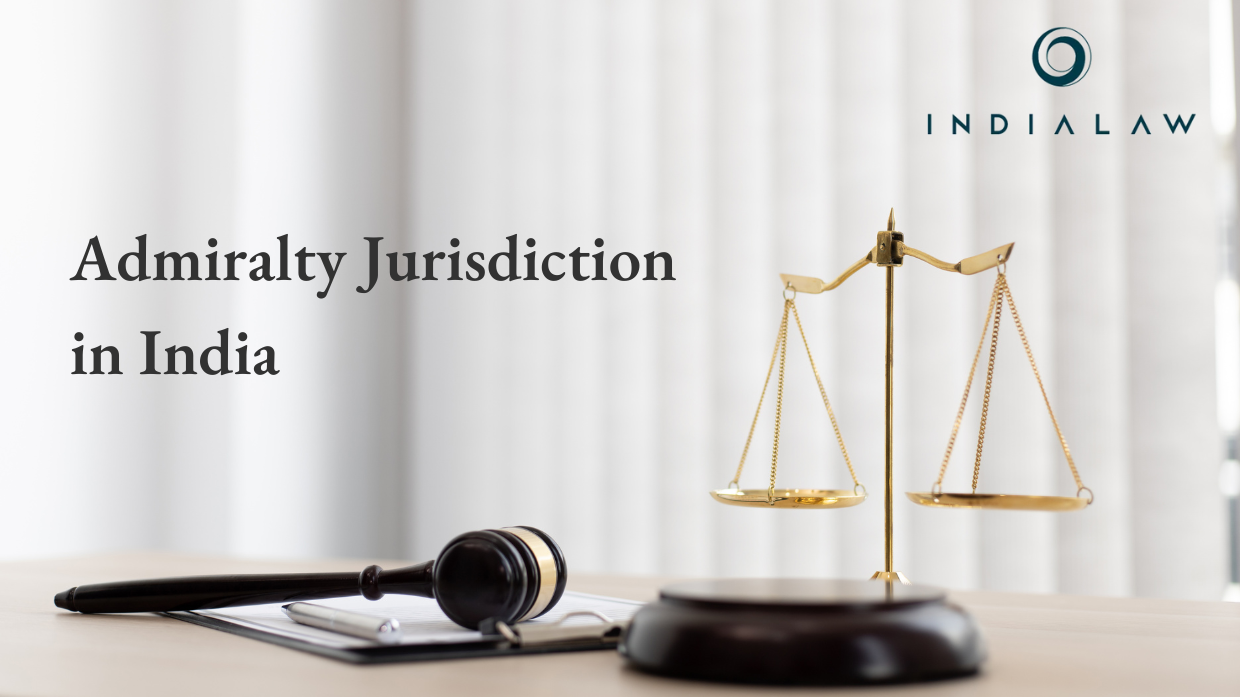Admiralty Jurisdiction in India

Introduction
The terms maritime and admiralty are often used interchangeably but there is a significant difference between both the terms. Maritime law relates to the legal rules dealing with the concept of carrying goods and passengers by water. Whereas, the Admiralty jurisdiction relates to the claims that are associated with navigable waterways and transport by sea. The Law Commission of India in its 151st Report observed the admiralty jurisdiction as the branch of law that regulates maritime matters of civil and criminal nature.
Table of Contents
The development of modern admiralty jurisdiction can be traced from Western countries particularly England, as being an island, has all along been engaged in commercial business through the sea and in that process the admiralty law developed.[1]
The importance of a codification of the law on admiralty jurisdiction can be realised by the fact that India being one of the major seafaring nations, having a coastline of approximately 7,517 kilometres and located between the Arabian Sea and the Bay of Bengal. The geographical location of India has helped in establishing a commercial business via sea route with the rest of the world.
Sea transportation is one of the important pillars for the success of globalisation as more than 90 percent of the world trade is done via sea route. Due to the significant efforts of the Government of India there has been a continuous increase in the trade volume via sea with other nations. Considering the importance of maritime industry in overall economy of India, a proper legal framework which governs and regulates the disputes related to maritime claims is required. In line of the same, the Admiralty (Jurisdiction and Settlement of Maritime Claims) Act, 2017 (herein after referred to as the Act) came into force on the 1st April, 2018. The Act consolidates the existing laws relating to the admiralty jurisdiction, legal proceedings in connection with the vessels, arrest, detention and sale of the vessel and other matters that are connected or incidental to the admiralty jurisdiction.
The Act repeals the following British era admiralty laws on civil matters-
- The Admiralty Court Act, 1861;
- The Colonial Courts of Admiralty Act, 1890;
- The Colonial Courts of Admiralty (India) Act, 1891; and
- The provisions of the Letters Patent, 1865 in so far as it applies to the admiralty jurisdiction of the Bombay, Calcutta and Madras High Courts.
Applicability of the Act
The Act applies to every vessel, irrespective of the place of residence or domicile of the owner.
Exception to the Applicability-
The Act shall not apply to the following vessels-
- Inland vessel defined in clause (a) of sub-section (1) of section 2 of the Inland Vessels Act, 1917;
- A vessel under construction that has not been launched unless it is notified by the Central Government to be a vessel for the purposes of the Act;
- A warship, naval auxiliary or other vessel owned or operated by the Central or a State Government and used for any non-commercial purpose; and
- Foreign vessel which is used for any non-commercial purpose as may be notified by the Central Government.
Admiralty Jurisdiction
Section 2(1)(e) of the Act, specifies the list of the High Courts having admiralty jurisdiction. The Act conferred admiralty jurisdiction to eight High Courts of India, including the High Court of Calcutta, Bombay, Madras, Karnataka, Gujarat, Orissa, Kerala and Hyderabad. The jurisdiction of the High Courts in respect of all maritime claims be exercisable over the waters up to and including the territorial waters of their respective jurisdictions.[2]
Maritime Claims
The High Court having admiralty jurisdiction is empowered to determine any question against any vessel relating to a maritime claim arising out of any (i) dispute regarding possession or ownership of a vessel, (ii) loss or damage caused by the operation of a vessel, (iii) loss of life or personal injury occurring whether on land or on water, in direct connection with the operation of a vessel, (iv) loss or damage to or in connection with any goods, (v) agreement relating to the carriage of goods or passengers on board a vessel, whether contained in a charter party or otherwise, (vi) agreement relating to the use or hire of the vessel, whether contained in a charter party or otherwise, etc.[3]
Arrest of Vessel in Rem
In an era of globalisation, the trade among nations via sea is increasing day by day. Vessels play a crucial role in transportation of the goods from one nation to another. As the vessel travels from port to port in different parts of the world, there are also chances that the vessel may involve in certain liabilities like collisions, loss of life or damage to the goods, etc., in their voyage in a foreign jurisdiction. Now, the question is that how a maritime claim can be secured for the liabilities incurred by the vessel in a foreign jurisdiction considering the fact that the owner of the vessel has neither the property nor any residence within a foreign jurisdiction. The usual practice followed by the courts having admiralty jurisdiction to secure the maritime claim is to arrest the vessel. The main purpose for the arrest of the vessel is to obtain the security for the satisfaction of the judgment.
The Supreme Court of India in its judgement of M.V. Elisabeth v. Harwan Investment & Trading (P) Ltd[4]., held that-
“Maritime law is as much a part of the general legal system as any other branch of the law. It is within the competence of the appropriate Indian Courts to deal, in accordance with the general principles of maritime law and the applicable provisions of statutory law, with all persons and things found within their jurisdiction. The power of the court is plenary and unlimited unless it is expressly or by necessary implication curtailed. Absent such curtailment of jurisdiction, all remedies which are available to the courts to administer justice are available to a claimant against a foreign ship and its owner found within the jurisdiction of the High Court concerned. This power of the court to render justice must necessarily include the power to make interlocutory orders for arrest and attachment before judgment. Power to enforce claims against foreign ships is an essential attribute of admiralty jurisdiction and it is assumed over such ships while they are within the jurisdiction of the High Court by arresting and detaining them. This jurisdiction can be assumed by the High Court concerned, whether or not the defendant resides or carries on business, or the cause of action arose wholly or in part, within the local limits of its jurisdiction. Once a foreign ship is arrested within the local limits of the jurisdiction of the High Court, and the owner of the ship has entered appearance and furnished security to the satisfaction of the High Court for the release of the ship, the proceedings continue as a personal action.”
The High Court having admiralty jurisdiction may order arrest of any vessel within their territorial water for the purpose of providing security against a maritime claim if the High Court is satisfied that (i) owner of the vessel at the time when maritime claim arose is liable for the claim, (ii) the claim is based on a mortgage or a charge of the vessel, (iii) the claim is related to the possession or ownership of the vessel, etc. [5]
Release of the Arrested Vessel
While taking note of the then Admiralty Rules regarding the release of vessel arrested, the Supreme Court of India in a matter of Videsh Sanchar Nigam Ltd. v. M.V. Kapitan Kud and Others[6], observed that-
“The admiralty action is an action in rem. A ship arrested under warrant may be released on fulfilment of any of the conditions (as provided under Rule 954 of the Admiralty Rules) viz. (i) at the request of the plaintiff before an appearance in person or vakalatnama is filed by the defendant; or (ii) on the defendant paying into court the amount claimed in the suit; or (iii) on the defendant giving such security for the amount claimed in the suit as the court may direct; or (iv) on any other ground that the court may deem just. This could be done on the plaintiff showing prima facie reasonably arguable best case.”
Protection of Owner of Vessel Arrested
The High Court while passing an order of the arrest of a vessel may impose a condition upon the claimant who had sought for arrest of vessel to provide an unconditional undertaking to pay such sums of money as damages or such security of a kind for an amount as determined by the High Court, for any loss or damage which may be incurred by the defendant as a result of the arrest and for which claimant may be found liable in case (a) the arrest having been wrongful or unjustified, or (b) excessive security having been demanded and provided.[7]
Procedure and Appeal
The Code of Civil Procedure, 1908 shall be applicable in all proceedings before the High Court vested with admiralty jurisdiction.[8] The appeal from a judgment, decree, final order or interim order of a single Judge of the High Court shall lie to a Division Bench of the High Court.[9]
Conclusion
The Admiralty (Jurisdiction and Settlement of Maritime Claims) Act, 2017, a newly enacted Act is a welcoming change in the field of admiralty jurisdiction. The Act consolidates the law relating to admiralty jurisdiction and removes all ambiguities or uncertainties of laws on civil matters of admiralty jurisdiction of Courts. The Act extends admiralty jurisdiction on High Courts of coastal States in comparison to previous laws which confers admiralty jurisdiction only to those High Courts which were established under the Letters Patent, 1865.
[1] Shuvro Prosun Sarker and Shreyasi Bhattacharya, Tracing Admiralty Law in India, (CMR University Journal for Contemporary Legal Affairs), at p. 2
[2] Section 3 of the Admiralty (Jurisdiction and Settlement of Maritime Claims) Act, 2017
[3] Section 4 of the Admiralty (Jurisdiction and Settlement of Maritime Claims) Act, 2017
[4] 1993 Supp (2) SCC 433
[5] Section 5 of the Admiralty (Jurisdiction and Settlement of Maritime Claims) Act, 2017
[6] (1996) 7 SCC 127
[7] Section 11 of the Admiralty (Jurisdiction and Settlement of Maritime Claims) Act, 2017
[8] Section 12 of the Admiralty (Jurisdiction and Settlement of Maritime Claims) Act, 2017
[9] Section 14 of the Admiralty (Jurisdiction and Settlement of Maritime Claims) Act, 2017
By entering the email address you agree to our Privacy Policy.



